
The Lutheran Church—Missouri Synod (LCMS), also known as the Missouri Synod, is a traditional, confessional Lutheran denomination in the United States. With 1.8 million members, it is the second-largest Lutheran body in the United States. The LCMS was organized in 1847 at a meeting in Chicago, Illinois, as the German Evangelical Lutheran Synod of Missouri, Ohio, and Other States, a name which partially reflected the geographic locations of the founding congregations.
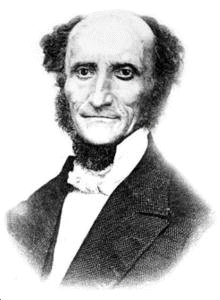
Carl Ferdinand Wilhelm Walther was a German-American Lutheran minister. He was the first president of the Lutheran Church–Missouri Synod (LCMS) and its most influential theologian. He is commemorated by that church on its Calendar of Saints on May 7. He has been described as a man who gave up his homeland for the freedom to speak freely, to believe freely, and to live freely, by emigrating from Germany to the United States.

Concordia Seminary is a Lutheran seminary in Clayton, Missouri. The institution's primary mission is to train pastors, deaconesses, missionaries, chaplains, and church leaders for the Lutheran Church–Missouri Synod (LCMS). Founded in 1839, the seminary initially resided in Perry County, Missouri. In 1849, it was moved to St. Louis, and in 1926, the current campus was built.

The Book of Concord (1580) or Concordia is the historic doctrinal standard of the Lutheran Church, consisting of ten credal documents recognized as authoritative in Lutheranism since the 16th century. They are also known as the symbolical books of the Evangelical Lutheran Church.

Martin Stephan (1777–1846) was pastor of St. John Lutheran Church in Dresden, Germany during the early 19th century. He organized the Saxon emigration to the United States in the early 19th century.
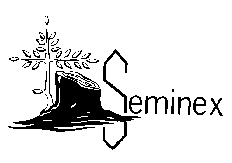
Seminex is the widely used abbreviation for Concordia Seminary in Exile, which existed from 1974 to 1987 after a schism in the Lutheran Church–Missouri Synod (LCMS). The seminary in exile was formed due to the ongoing Fundamentalist–Modernist Controversy that was dividing Protestant churches in the United States. At issue were foundational disagreements on the authority of Scripture and the role of Christianity. During the 1960s, many clergy and members of the LCMS grew concerned about the direction of education at their flagship seminary, Concordia Seminary, in St. Louis, Missouri. Professors at Concordia Seminary had, in the 1950s and 1960s, begun to utilize the historical-critical method to analyze the Bible rather than the traditional historical-grammatical method that considered scripture to be the inerrant Word of God.

Friedrich Conrad Dietrich Wyneken was a missionary pastor in the United States. He also served for fourteen years as the second president of the Lutheran Church–Missouri Synod, and helped found Concordia Theological Seminary.

Wilhelm Sihler was a German American Lutheran minister. A proponent for Christian education, Wilhelm Sihler founded Concordia Theological Seminary, in Fort Wayne, Indiana.
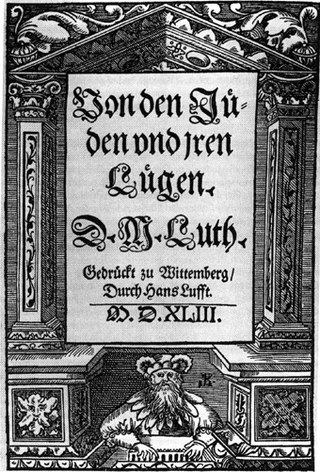
On the Jews and Their Lies is a 65,000-word anti-Judaic and antisemitic treatise written in 1543 by the German Reformation leader Martin Luther (1483–1546).
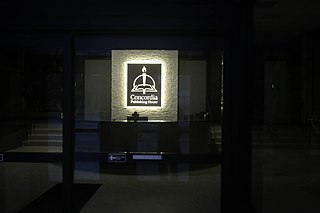
Concordia Publishing House (CPH), founded in 1869, is the official publishing arm of the Lutheran Church–Missouri Synod (LCMS). Headquartered in St Louis, Missouri, at 3558 S. Jefferson Avenue, CPH publishes the synod's official monthly magazine, The Lutheran Witness, and the synod's hymnals, including The Lutheran Hymnal (1941), Lutheran Worship (1982), and Lutheran Service Book (2006). It publishes a wide range of resources for churches, schools, and homes and is the publisher of the world's most widely circulated daily devotional resource, Portals of Prayer. Its children's books, known as Arch Books, have been published in millions of copies. Concordia Publishing House is the oldest publishing company west of the Mississippi River and the world's largest distinctly Lutheran publishing house.

Hermann Otto Erich Sasse was a German Lutheran pastor, theologian, and author. He was considered one of the foremost confessional Lutheran theologians of the 20th century.
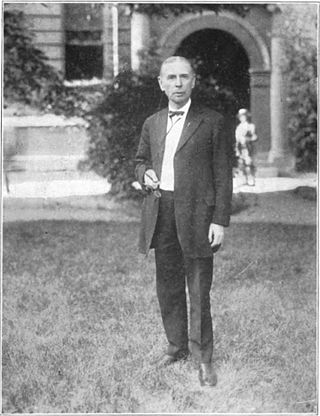
Franz August Otto Pieper was a Confessional Lutheran theologian who also served as the fourth president of what was known at that time as the German Evangelical Lutheran Synod of Missouri, Ohio, and Other States.
Lutheran orthodoxy was an era in the history of Lutheranism, which began in 1580 from the writing of the Book of Concord and ended at the Age of Enlightenment. Lutheran orthodoxy was paralleled by similar eras in Calvinism and tridentine Roman Catholicism after the Counter-Reformation.

Martin Luther was a German priest, theologian, author, hymnwriter, professor, and Augustinian friar. He was the seminal figure of the Protestant Reformation, and his theological beliefs form the basis of Lutheranism.
This is a selected list of works by and about Martin Luther, the German theologian. The emphasis is on English language materials.
Robert Kolb is professor emeritus of Systematic Theology at Concordia Seminary, St. Louis, Missouri, and a world-renowned authority on Martin Luther and the history of the Reformation.
Martin Luther (1483–1546) was a German professor of theology, priest and seminal leader of the Reformation. His positions on Judaism continue to be controversial. These changed dramatically from his early career, where he showed concern for the plight of European Jews, to his later years, when embittered by his failure to convert them to Christianity, he became outspokenly antisemitic in his statements and writings.

Robert David Preus was an American Lutheran pastor, professor, author, and seminary president.
Lutheranism is a major branch of Protestantism, identifying primarily with the theology of Martin Luther, the 16th-century German monk and reformer whose efforts to reform the theology and practices of the Catholic Church launched the Protestant Reformation.
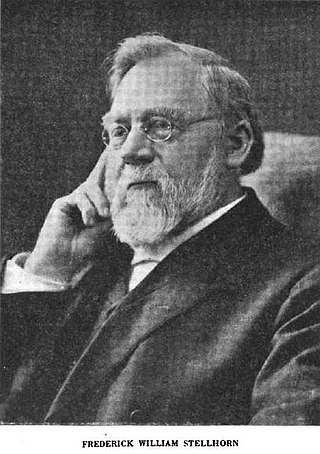
Frederick William Stellhorn, an American Lutheran theologian, was born in Brüninghorstedt, a community in Warmsen the Landkreis of Hannover, in Lower Saxony (Niedersachsen), Germany.












